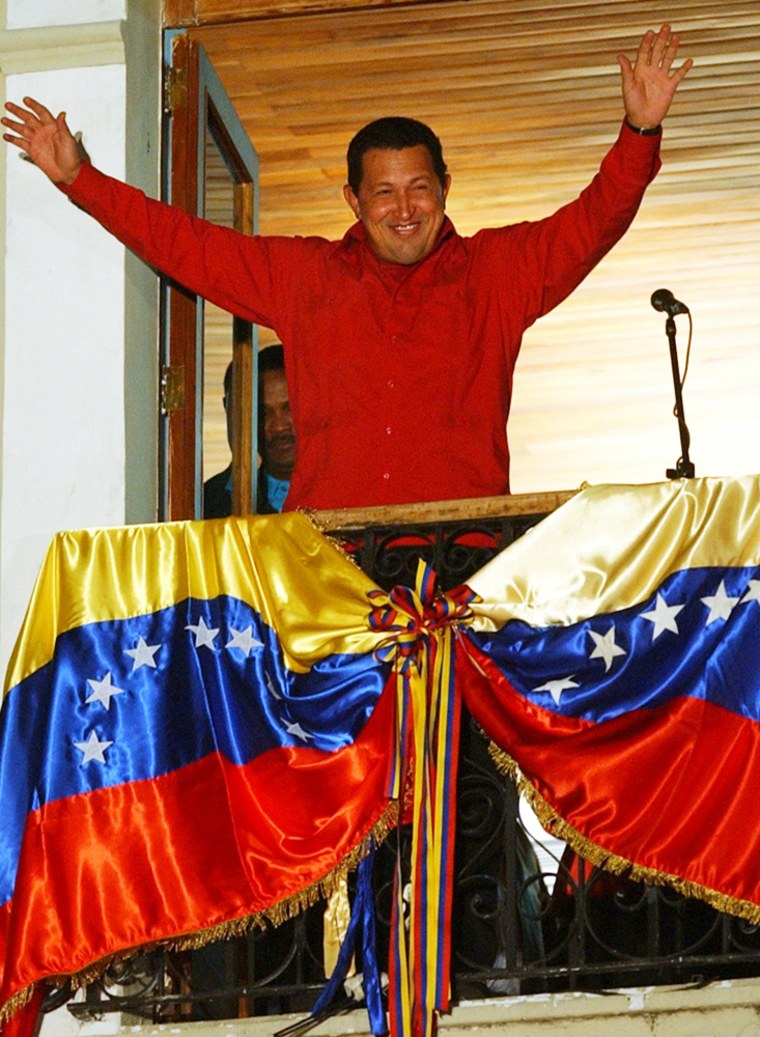President Hugo Chavez survived a referendum to oust him, according to results Monday, and former U.S. President Jimmy Carter and other election observers urged the opposition to accept the vote, deflating claims of fraud.
The victory stunned opposition figures who have fought for years to oust Chavez and will likely give him an even broader mandate for his “revolution for the poor.” Chavez is seen as a hero by Venezuela’s majority poor but as an authoritarian by his critics, particularly among the wealthy.
Though the opposition swiftly rejected the results, saying they were fraudulent, Carter and the head of the Organization of American States, who led observer teams, said the voting appeared clean.
Carter said the partial results announced Monday morning by election officials showing a wide margin of victory for Chavez “coincided” with his own team’s findings.
“Now it’s the responsibility of all Venezuelans to accept the results and work together for the future,” he said.
OAS Secretary-General Cesar Gaviria said observers “have not found any element of fraud in the process.” The State Department also said there was no evident pattern of fraud in the balloting, but a final judgment depends on what observers report.
The first-ever recall vote for a president in Venezuela’s history was aimed at putting a lid on years of violent political unrest and a bloody coup, and it came after a lengthy and complicated petitioning process.
With 94 percent of the votes counted, Chavez had 58 percent of the vote and the opposition 42 percent, Francisco Carrasquero, president of the National Elections Council, said ahead of the news from the monitoring team.
Chavez: 'No turning back'
Chavez, the champion of Venezuela’s majority poor and the nemesis of the wealthier classes, claimed victory and said he would continue to wage his “revolution for the poor.”
“Venezuela has changed forever,” he said in a speech. “There is no turning back.”
He also claimed repeatedly that opposition leaders were pawns of President Bush.
“Hopefully, from this day on Washington will respect the government and people of Venezuela,” Chavez boomed from a palace balcony.
Carrasquero said 4,991,483 votes were cast against recalling the former army paratrooper, and 3,576,517 in favor.
“It is absolutely impossible that the victory of the ‘no’ be reversed,” Chavez told thousands of cheering and whistling backers. “This has been a great victory for the Venezuelan people.”
Opposition leaders refused to accept the results and demanded a manual recount, claiming their own exit polls showed almost 60 percent of citizens voted to oust Chavez.
Elections board criticized
At opposition headquarters in Caracas, opponents watching Carrasquero’s announcement on television shouted, “Fraud! Fraud!”
“We categorically and absolutely reject these results,” said Henry Ramos Allup, leader of the Democratic Coordinator coalition of opposition parties. “The National Elections Council has committed a gigantic fraud.”
Haydee Deutsch, an opposition leader, said the opposition “has no doubt that we won by an overwhelming majority.”
Indicating a possible split in the five-member elections council, Sobella Mejia — who is aligned with the opposition — told a news conference before the tallies were announced that any release of partial figures would be premature and invalid.
News of Chavez’s victory drove down crude oil prices from record highs Monday, easing fears of a disruption in supply from the world’s fifth-largest oil exporter. Venezuela normally supplies almost 15 percent of U.S. imports.
U.S. light crude oil for September was down 53 cents at $46.05 a barrel Monday, off an early peak of $46.91 a barrel, a new high in the 21-year history for the New York Mercantile Exchange contract.
The referendum comes after a two-year drive to oust Chavez that included a short-lived 2002 coup, a devastating two-month strike and political riots in March that claimed a dozen lives.
Venezuelans could either vote “yes” to recall Chavez or “no” to allow him to serve out the remainder of a six-year term that began in 2000.
For Chavez to lose, there had to be more “yes” than “no” votes and more “yes” votes than the nearly 3.8 million votes he received in the 2000 presidential elections.
Record turnout
With more than 8.5 million votes cast, Sunday’s referendum shattered the previous record of voter turnout, when 7.5 million Venezuelans cast ballots in the 1988 presidential elections.
Carter said it was the largest turnout he had ever seen, and lines extended for more than a mile in some places.
Activists from both sides urged voters to the polls, but they needed little pushing. Venezuelans tend to love or hate Chavez, 50, with sentiment drawn along class lines.
Chavez is a champion among the majority poor for freely spending on social programs with Venezuela’s oil revenues. But his vilification of the rich and close ties with Cuban leader Fidel Castro made him many enemies among the wealthy.
The sheer number of voters, coupled with problems with electronic thumbprint ID machines, led election officials to twice postpone the polls’ closing, first to midnight — eight hours later than originally scheduled — then until everyone in line had voted.
